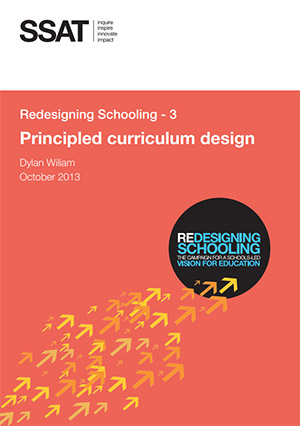
Did you know? You can access 100s of resources by becoming an SSAT member.
Login or enquire today.
Redesigning Schooling – 3: Principled curriculum design
The third pamphlet in the series “Redesigning Schooling – 3: Principled curriculum design”, by Professor Dylan Wiliam is a comprehensive guide for education professionals on the effective design of school curricula. It offers an insightful exploration of various educational principles and practices vital in developing a curriculum that is not only academically sound but also adaptable to the changing educational landscape.
In recent years in England, discussion of the school curriculum has been all but absent. This neglect has been largely driven by the adoption in 1988 of a national curriculum for schools in England and Wales. Many teachers, leaders, and policymakers assumed that because the government had specified what schools were required to teach, then no further discussion of the issue of curriculum was necessary.
This belief was mistaken for two reasons. The first is that the legal framework of the national curriculum specified only what schools were legally required to teach – any school was entirely free to teach whatever it wished in addition to the prescribed national curriculum. The second is that the real curriculum – the lived daily experience of young people in classrooms – requires the creative input of teachers. For example, the national curriculum may require that students learn about negative numbers, but the kinds of analogy that a teacher might use to teach this topic (e.g., heights above and below sea level, temperatures above and below zero, positive and negative bank balances, and so on) must be chosen with an understanding of the students, their experiences, and a range of other contextual factors. So, the real curriculum is created by teachers, every day.
Addressing the challenges faced by educators in an ever-changing world, Wiliam introduces seven foundational principles of curriculum design. These principles encapsulate the essence of a balanced, rigorous, coherent, vertically integrated, and relevant curriculum. The pamphlet serves as an indispensable resource for education professionals, offering a pathway to design a curriculum that is not only intellectually stimulating but also caters to the diverse needs of students. It emphasises the critical role of teachers in the curriculum development process, advocating for a collaborative and reflective approach.
Recommended reading
Principled curriculum design: Coherence and relevance through ‘Dynamics Days’
St Mary's Catholic Academy in Blackpool innovates with 'Dynamic Days,' integrating holistic, project-based learning into its curriculum, enhancing student engagement and wellbeing through diverse, ethos-driven educational experiences.
Read morePrincipled curriculum design: Defining the butterfly, a mastery approach for subject discipline
This case study highlights Huntington School's new approach to curriculum design that places deep learning in the central concepts, ideas, key knowledge and skills of the curriculum as an important driver for pedagogy and assessment.
Read morePrincipled curriculum design: A futures-oriented personalised curriculum
This case study explores Essa Academy's principled approaches to curriculum design and delivery that genuinely meet the needs of the students and community the school serves.
Read morePrincipled curriculum design: Constructing the personalised curriculum at KS4
Discover Canons High School's journey in reshaping KS4 education through a personalised curriculum, blending academic rigour with enrichment, and impacting student wellbeing and academic success.
Read morePrincipled curriculum design: Using SOLO as a framework for developing and assessing KS3 learning
This case study from Canons High School illustrates an innovative approach in KS3 education using SOLO Taxonomy, prioritising mastery and in-depth learning over traditional content-focused methods.
Read morePrincipled curriculum design: Content and language integrated learning for subject discipline, breadth and rigour
Bohunt School's case study explores its pioneering CLIL approach, enhancing language proficiency and academic skills, resulting in notable student performance and development in secondary education.
Read moreSSAT Membership
Join SSAT to gain free access to our widest range of CPD, programmes, tools and resources.

